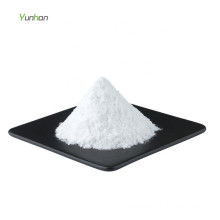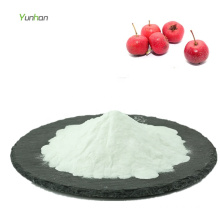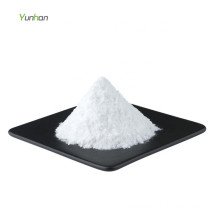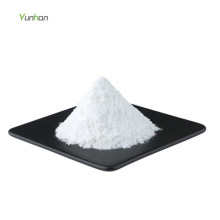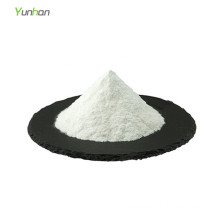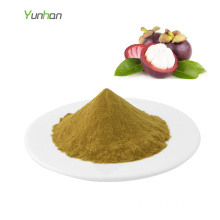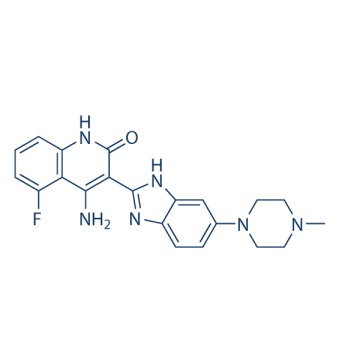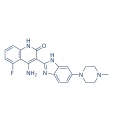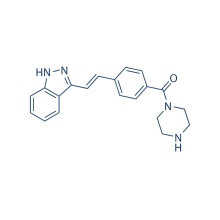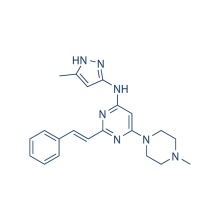Tandutinib (MLN518) 387867-13-2
Product Description
.cp_wz table {border-top: 1px solid #ccc;border-left:1px solid #ccc; } .cp_wz table td{border-right: 1px solid #ccc; border-bottom: 1px solid #ccc; padding: 5px 0px 0px 5px;} .cp_wz table th {border-right: 1px solid #ccc;border-bottom: 1px solid #ccc; padding: 5px 0px 0px 5px;}
Molecular Weight:
562.7 Tandutinib (MLN518, CT53518) is a potent FLT3 antagonist with IC50 of 0.22 μM, also inhibits PDGFR and c-Kit, 15 to 20-fold higher potency for FLT3 versus CSF-1R and >100-fold selectivity for the same target versus FGFR, EGFR and KDR. Phase 2.
Biological Activity
Tandutinib has little activity against EGFR, FGFR, KDR, InsR, Src, Abl,
PKC, PKA and MAPKs. Tandutinib inhibits IL-3-independent cell growth and
FLT3-ITD autophosphorylation with an IC50 of 10-100 nM. Tandutinib also
inhibits the proliferation of human leukemia Ba/F3 cells containing
FLT3-ITD mutations with IC50 values of 10-30 nM, and the
FLT3-ITD-positive Molm-13 and Molm-14 cells with an IC50 of 10 nM.
In
FLT3-ITD-positive Molm-14 cells but not the FLT3-ITD-negative THP-1
cells, Tandutinib treatment leads to significant Apoptosis by 51% and
78% at 24 and 96 hours, respectively, due to specific FLT3 inhibition. Tandutinib preferentially inhibits the growth of blast colonies from
FLT3 ITD-positive compared with ITD-negative patients with AML, without
affecting colony formation by normal human progenitor cells.
Oral administration of Tandutinib at 60 mg/kg bid significantly
increases the survival in mice bearing Ba/F3 cells expressing W51
FLT3-ITD mutant, and gives a significant reduction in mortality in a
mouse bone marrow transplantation model. Tandutinib
treatment at 180 mg/kg twice daily has mild toxicity toward normal
hematopoiesis, however, it is a dose at which Tandutinib is effective in
treating FLT3 ITD-positive leukemia in mice.
Cell based receptor autophosphorylation assays
Autophosphorylation of PDGFR family kinase assays are cell-based
enzyme-linked immunosorbent (ELISA) assays using CHO cells expressing
wild-type PDGFRβ, chimeric protein PDGFRβ/c-Kit, and PDGFRβ/Flt3 which
contain the extracellular and transmembrane domains of PDGFRβ and the
cytoplasmic domain of c-Kit, and Flt-3. Cells are grown to confluency in
96-well microtiter plates under standard tissue culture conditions,
followed by serum starvation for 16 hours.
Briefly, quiescent cells are
incubated at 37 °C with increasing concentrations of Tandutinib for 30
minutes followed by the addition of 8 nM PDGF-BB for 10 minutes. Cells
are lysed in 100 mM Tris, pH 7.5, 750 mM NaCl, 0.5% Triton X-100, 10 mM
sodium pyrophosphate, 50 mM NaF, 10 μg/mL aprotinin, 10 μg/mL leupeptin,
1 mM phenylmethylsulfonyl fluoride, 1 mM sodium vanadate, and the
lysate is cleared by centrifugation at 15,000g for 5 minutes.
Clarified
lysates are transferred into a second microtiter plate in which the
wells are previously coated with 500 ng/well of 1B5B11 anti-PDGFRβ mAb
and then incubated for 2 hours at room temperature. After washing three
times with binding buffer (0.3% gelatin, 25 mM HEPES, pH 7.5, 100 mM
NaCl, 0.01% Tween 20), 250 ng/mL of rabbit polyclonal
anti-phosphotyrosine antibody is added and plates are incubated at 37 °C
for 60 minutes.
Subsequently, each well is washed three times with
binding buffer and incubated with 1 μg/mL of horseradish
peroxidase-conjugated anti-rabbit antibody at 37 °C for 60 minutes.
Wells are washed prior to adding
2,2'-azino-bis(3-ethylbenzthiazoline-6-sulfonic acid), and the rate of
substrate formation is monitored at 650 nm.
Method
Cells are exposed to increasing concentrations of Tandutinib (0.004-30
μM). Cells are grown for 3-7 days in tissue culture, and viable cells,
determined by Trypan blue dye exclusion, are counted. At daily
intervals, cells are harvested, washed, and resuspended in 100 uL
binding buffer containing 10 mM HEPES (pH 7.4), 140 mM NaCl, and 2.5 mM
CaCl2.
Annexin V-FITC (100 ng) and propidium iodide (250 ng)
are added to the cell suspension followed by incubation at room
temperature for 15 minutes. Flow cytometry is performed immediately
after staining on a FACSort flow cytometer with excitation at 488 nm.
Fluorescence of annexin V-FITC and DNA propidium iodide staining are
measured at 515 nm and 585 nm, respectively.
Contact us if you need more details on 387867-13-2. We are ready to answer your questions on packaging, logistics, certification or any other aspects about Tandutinib 387867-13-2、MLN518 387867-13-2. If these products fail to match your need, please contact us and we would like to provide relevant information.
Molecular Weight:
562.7 Tandutinib (MLN518, CT53518) is a potent FLT3 antagonist with IC50 of 0.22 μM, also inhibits PDGFR and c-Kit, 15 to 20-fold higher potency for FLT3 versus CSF-1R and >100-fold selectivity for the same target versus FGFR, EGFR and KDR. Phase 2.
Biological Activity
Tandutinib has little activity against EGFR, FGFR, KDR, InsR, Src, Abl,
PKC, PKA and MAPKs. Tandutinib inhibits IL-3-independent cell growth and
FLT3-ITD autophosphorylation with an IC50 of 10-100 nM. Tandutinib also
inhibits the proliferation of human leukemia Ba/F3 cells containing
FLT3-ITD mutations with IC50 values of 10-30 nM, and the
FLT3-ITD-positive Molm-13 and Molm-14 cells with an IC50 of 10 nM.
In
FLT3-ITD-positive Molm-14 cells but not the FLT3-ITD-negative THP-1
cells, Tandutinib treatment leads to significant Apoptosis by 51% and
78% at 24 and 96 hours, respectively, due to specific FLT3 inhibition. Tandutinib preferentially inhibits the growth of blast colonies from
FLT3 ITD-positive compared with ITD-negative patients with AML, without
affecting colony formation by normal human progenitor cells.
Oral administration of Tandutinib at 60 mg/kg bid significantly
increases the survival in mice bearing Ba/F3 cells expressing W51
FLT3-ITD mutant, and gives a significant reduction in mortality in a
mouse bone marrow transplantation model. Tandutinib
treatment at 180 mg/kg twice daily has mild toxicity toward normal
hematopoiesis, however, it is a dose at which Tandutinib is effective in
treating FLT3 ITD-positive leukemia in mice.
Cell based receptor autophosphorylation assays
Autophosphorylation of PDGFR family kinase assays are cell-based
enzyme-linked immunosorbent (ELISA) assays using CHO cells expressing
wild-type PDGFRβ, chimeric protein PDGFRβ/c-Kit, and PDGFRβ/Flt3 which
contain the extracellular and transmembrane domains of PDGFRβ and the
cytoplasmic domain of c-Kit, and Flt-3. Cells are grown to confluency in
96-well microtiter plates under standard tissue culture conditions,
followed by serum starvation for 16 hours.
Briefly, quiescent cells are
incubated at 37 °C with increasing concentrations of Tandutinib for 30
minutes followed by the addition of 8 nM PDGF-BB for 10 minutes. Cells
are lysed in 100 mM Tris, pH 7.5, 750 mM NaCl, 0.5% Triton X-100, 10 mM
sodium pyrophosphate, 50 mM NaF, 10 μg/mL aprotinin, 10 μg/mL leupeptin,
1 mM phenylmethylsulfonyl fluoride, 1 mM sodium vanadate, and the
lysate is cleared by centrifugation at 15,000g for 5 minutes.
Clarified
lysates are transferred into a second microtiter plate in which the
wells are previously coated with 500 ng/well of 1B5B11 anti-PDGFRβ mAb
and then incubated for 2 hours at room temperature. After washing three
times with binding buffer (0.3% gelatin, 25 mM HEPES, pH 7.5, 100 mM
NaCl, 0.01% Tween 20), 250 ng/mL of rabbit polyclonal
anti-phosphotyrosine antibody is added and plates are incubated at 37 °C
for 60 minutes.
Subsequently, each well is washed three times with
binding buffer and incubated with 1 μg/mL of horseradish
peroxidase-conjugated anti-rabbit antibody at 37 °C for 60 minutes.
Wells are washed prior to adding
2,2'-azino-bis(3-ethylbenzthiazoline-6-sulfonic acid), and the rate of
substrate formation is monitored at 650 nm.
Method
Cells are exposed to increasing concentrations of Tandutinib (0.004-30
μM). Cells are grown for 3-7 days in tissue culture, and viable cells,
determined by Trypan blue dye exclusion, are counted. At daily
intervals, cells are harvested, washed, and resuspended in 100 uL
binding buffer containing 10 mM HEPES (pH 7.4), 140 mM NaCl, and 2.5 mM
CaCl2.
Annexin V-FITC (100 ng) and propidium iodide (250 ng)
are added to the cell suspension followed by incubation at room
temperature for 15 minutes. Flow cytometry is performed immediately
after staining on a FACSort flow cytometer with excitation at 488 nm.
Fluorescence of annexin V-FITC and DNA propidium iodide staining are
measured at 515 nm and 585 nm, respectively.
Contact us if you need more details on 387867-13-2. We are ready to answer your questions on packaging, logistics, certification or any other aspects about Tandutinib 387867-13-2、MLN518 387867-13-2. If these products fail to match your need, please contact us and we would like to provide relevant information.
Product Categories : Protein Tyrosine Kinase > FLT3 Inhibitor
Other Products
Hot Products
Astragaloside AChlortetracycline HCl 64-72-2Paclitaxel 33069-62-4Dexamethasone Acetate 1177-87-3Dinaciclib (SCH727965) 779353-01-4CHIR-124 405168-58-3Ro3280 1062243-51-9TAME 901-47-3CCG-1423 285986-88-110058-F4 403811-55-2Dabigatran (BIBR 953) 211914-51-1H 89 2HCl 130964-39-5T0901317 293754-55-9Aprepitant 170729-80-3Turofexorate Isopropyl (XL335) 629664-81-9BMS-378806 357263-13-9


